
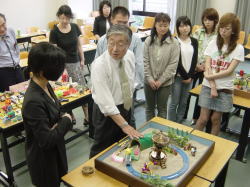


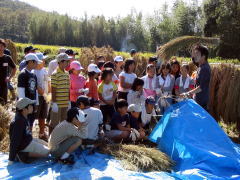
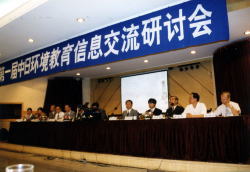
In order to foster links between sustainable society and human
well-being, we seek to connect local activities to global thinking. Through local activities we gain wisdom; this
wisdom can be the origin of thinking globally.
At the same time, through global thinking we gain insight into the
guidelines for local activities.
On
the other hand, through establishing an international network for environmental
ethics and education we can integrate a framework and pragmatic application
toward sustainable society. To find
viable solutions to environmental problems, we seek a concrete strategy to
reach consensus for a social contract as global citizens.
Environmental Education is implemented in various diverse fields
and has contributed to the resolution of environmental problems to some extent.
However, the character of too many themes, fields, and methods involved
in environmental education makes it rather vague for both teachers and
students to understand their direction, which objective to achieve among
many subjects, what meaning to attach to the field activities, and so on.
In
order to communicate effectively, environmental education needs to establish a
common ground by means of vocabulary standardization through the translation of
technical scientific terms into readily accessible language and by the
consolidation of diverse materials into common sets of materials. After these procedures, it could be possible for us to establish a “Guideline
of Environmental Education Based on Environmental Ethics".
![]() in 1996
in 1996
+International Symposium'96: Environmental Ethics and
Environmental Education: Living Together with Nature
Konan University | Japan
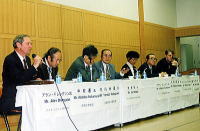 International Symposium'96
International Symposium'96
+International Symposium'98: Environmental Ethics and
Environmental Education: The Issues on Technology and
Human Nature
Konan University | Japan
![]() in 1999
in 1999
+International Symposium of Informational Exchange for
Environmental Education between Japan and China
Peking University | China
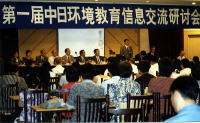 International Symposium between Japan and China in 1999
International Symposium between Japan and China in 1999
![]() in 2000
in 2000
+International Congress on Environmental Ethics and
Environmental Education in Thailand: Environmental
Education for Environmental Ethics
Rajabhat Institute Phranakhon | Thailand
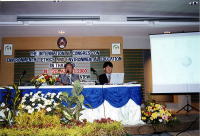 International Symposium between Japan and Thailand in 2000
International Symposium between Japan and Thailand in 2000
![]() in 2001
in 2001
+The 4th International Conference of Health Behavioral
Science: Integrated Approaches to Health
Konan University | Japan
+The 5th International Conference on the Environmental
Management of Enclosed Coastal Sea (EMECS2001)
Kobe | Japan
![]() in 2002
in 2002
+The 2nd International Symposium of Informational Exchange
for Environmental Education between Japan and China
Konan University | Japan
+The 11th Northeast Asian Conference on Environmental
Cooperation, Ministry of Environment
Hainan | China
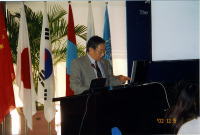 The 11th North Asian Conference in 2002
The 11th North Asian Conference in 2002
![]() in 2003
in 2003
+Field Course: Ethnobotany and Environmental Philosophy:
A Field Course in Southern British Columbia
University of Victoria | Canada
![]() in 2004
in 2004
+International Congress between Japan and Thailand:
Constructing Global Partnership between Universities
for Environmental Education
Konan University | Japan
+Asia-Pacific Network for Global Change Research(APN) 10th
Anniversary IGM/SPG Global Change Research and
Environmental Education: the APN's Expected Roles
Kobe | Japan
 APN 1oth
Anniversary IGM/SPG in 2005
APN 1oth
Anniversary IGM/SPG in 2005+International Symposium: Establishing Guidelines for
Environmental Education Based on Environmental Ethics
Kobe | Japan
+The 5th International Conference of Health Behavioral
Science: Education on Health and Environment
Phranakhon Rajabhat University | Thailand
+International Symposium: Establishing Guidelines for
Environmental Education Based on Environmental
Ethics (III)
University of Malaya | Malaysia
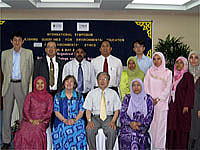 International Symposium in 2007
International Symposium in 2007+Sweden-Japan Joint Environmental Colloquium:
Sustainability of Natural Environment
Stockholm School of Economics|JSPS Stockholm Office|Sweden
+JSPS-VCC Comprehensive Seminar 2008:
Environmental Science, Engineering & Ethics
Kyoto University(JSPS-VCC Core University Programme)|Japan
▪ Organic Agriculture at Konan University
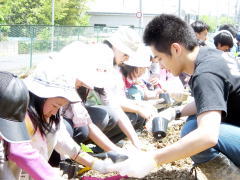
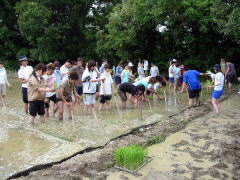
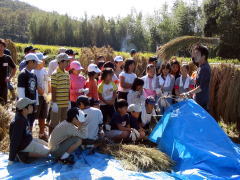
Implementations of Environmental Education; organic agriculture, left, rice planting and harvest of rice
▪ Establishing Partnerships for Environmental Education

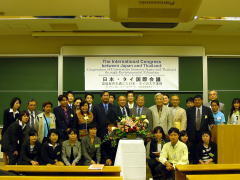
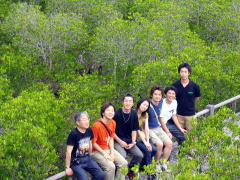
Overseas Field Studies; lecture of field course by Dr. Mary Thomas collaborated with University of Victoria, Canada in 2003, left,
student meeting between Konan University and Phranakhon Rajabhat University, Thailand in 2004,
and field trip in mangrove forest in Thailand in 2005
▪ Community based Activities
▪ Off-Campus Activities
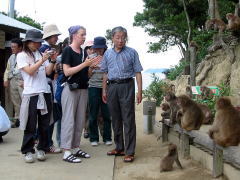
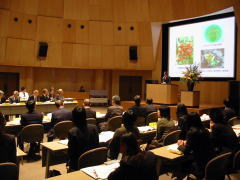
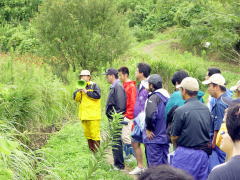
Off-Campus Activities; research on deformed monkeys at Awaji Monkey Center collaborated with Ms. Sarah Turner, left,
a presentation on community based activity of environmental education in the Kobe City Hall,
and support for field trip on capacity building to general public at Aina National Government Park.